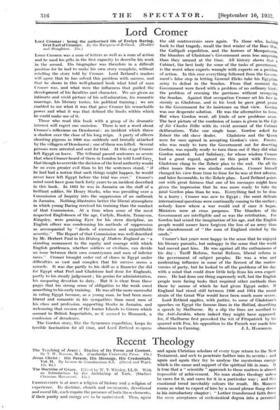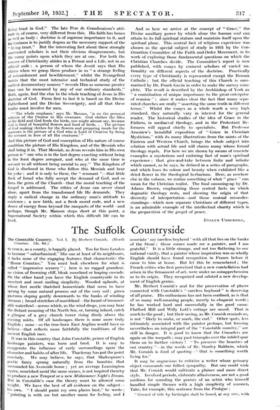Recent Theology
The Teaching of Jesus : Studies of Its Form and Content.
Vol. II. By Leone° de Grandmaison S.J. (Shced and Ward.
12s. ed.) •
Cumsn.trarY_is at once a religion of history and a .religion of experience. Its doctrine, church and sacraments, devotional and moral life, each require the presence of both these elements, if their purity and energy are to be inaintni:lcd. Thus, again and again Christian scholars of every type return to the New Testament, and seek to penetrate further into its secrets: and again and again they try to analyse the mysterious energy which is the cause and support of the spiritual life in man. It is true that a "scientific " approach to these matters is almost impossible of achievement. No man studies theology unless he cares for it, and cares for it in a particular way ; and this emotional trend inevitably colours the result. Mr. Manson warns us what to expect of him by a casual phrase flung down in his introductory chapter.: "Luther transformed faith from the mere acceptance of ecclesiastical dogma into a personal living trust in God." The late Pere de Grandmaison's atti- tude is, of course, very different from this. His faith has bones os well as body : doctrine is of supreme importance to it, and his business is to justify dogma as the necessary support of the "living trust." But the interesting fact about these strongly contrasted scholars is not their obvious disagreements, but the many points upon which they are at one. For both the essence of Christianity abides in a Person and a Life, not in an ethical code : a person of whom the Jesuit says that His claims when we grasp them produce in us "a strange feeling of astonishment and bewilderment," whilst the Evangelical insists that the most intensive and technical study of the earliest documentary sources reveals Him as someone greater than can be measured by any of our ordinary standards." Both, again, find the clue to the whole teaching of Jesus in His doctrine of God. From first to last it is based on the Divine Fatherhood and the Divine Sovereignty, and all that these truths must involve for men.
" ' The whole emphasis,' says Mr. Manson, 'is on the personal relation of the Creator to His creatures. God clothes the lilies of the field and God feeds the birds, one might almost say, because God is fond of beautiful flowers and fond of birds. . . The picture of God making clothes for the flowers and preparing Meals for the sparrows is the picture of a God who is Lord of Creation by being the servant in love of all His creatures.'" And this picture of God and conception of His nature of course condition the picture of His Kingdom, and of the Messiah who shall bring it in. That Messiah, as Jesus reveals him in His own person is" one who is in the last degree exacting without being in the least degree arrogant, and who at the same time is servant to all without being menial to any." The Kingdom of God is disclosed in those who follow this Messiah and bear his yoke : and it is only to these, the remnant "—that little flock of Israel who fully accept the demand of God, and so form the germ of the Church—that the moral teaching of the Gospel is addressed. The ethics of Jesus can never stand alone, apart from the transformed life He demands. They imply a radical change in the ordinary man's attitude to existence ; a new birth, not a fresh moral code, and a new dower of energy from beyond the ramparts of the world—and perhaps, though Mr. Manson stops short at this point, a Supernatural Society within which this difficult life can be lived. And so here we arrive at the concept of "Grace," the Divine auxiliary power by which alone the human soul can attain to its full spiritual stature and maintain itself upon the spiritual plane. This central fact of religious experience was chosen as the special subject of study in 1931 by the Con- tinuation Committee of the Faith and Order Movement, in its work of exploring those fundamental questions on which the Christian Churches divide. The Committee's report is now published, with essays by eminent scholars of varied na- tionality on different aspects of the doctrine. Practically every type of Christianity is represented except the Roman Catholic ; but the official teaching of this Church is sum- marized by Dr. Frank Gavin in order to make the survey com- plete. The result is described by the Archbishop of York as "a contribution of unique importance to the great enterprise of reunion " ; since it makes clear the fact that many sepa- rated churches are really 'asserting the same truth in different terms." Whilst the essays as a whole reach a very high standard, they naturally vary in interest for the general reader. The historical studies of the idea of Grace in the Fathers, in mediaeval theology, and in the Protestant Re- formers will appeal chiefly to specialists. But • Professor Arseniew's beautiful exposition of "Grace in Christian Mysticism," with its many illustrations from the saints of the Eastern and Western Church, brings the whole subject into relation with actual life and will charm many whom formal -theology repels. For here we are shown by means of concrete examples a inysterious and enduring fact of man's spiritual experience : that give-and-take between finite and infinite which cannot, as he says, be defined in a series of paragraphs, and which loses its colour and beauty when exhibited like a dried flower in the theological herbarium. Here, as nowhere else in the volume, we realize something of what" grace" can mean for the Christian realist. The final summing-up by Dr. Adams Brown, emphasizing those central facts on which dogmatic theology rests, and showing the origin of that diversity of interpretation—and those mutual misunder- standings—which now separate Christians of different types, is an admirable example of the intellectual charity which is the preparation of the gospel of peace.
EVELYN UNDERHILL,































 Previous page
Previous page